|
|
|
Sort Order |
|
|
|
Items / Page
|
|
|
|
|
|
|
| Srl | Item |
| 1 |
ID:
152050
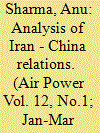

|
|
|
| 2 |
ID:
115425


|
|
|
| 3 |
ID:
162698
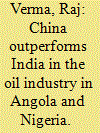

|
|
|
|
|
| Summary/Abstract |
The article asserts that China’s NOCs have trumped Indian oil companies in four ways. First, Chinese NOCs have more oil blocks in Angola and Nigeria relative to Indian oil companies. Second, NOCs from China are able to outbid Indian oil companies if and when they directly compete for the same oil blocks. Third, Chinese NOCs have better quality oil blocks compared to Indian oil companies. Fourth, Chinese NOCs are preferred as partners by African NOCs and international oil companies. It provides a more comprehensive explanation of the above observations by examining macro level factors such as difference in the economic, political and diplomatic support received by the Chinese and Indian oil companies from their respective governments and foreign exchange reserves and micro level factors such as access to capital, rate of return on investment, pricing of oil and risk aversion.
|
|
|
|
|
|
|
|
|
|
|
|
|
|
|
|
| 4 |
ID:
183186
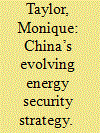

|
|
|
|
|
| Summary/Abstract |
This article explores the ways in which China's energy security strategy has evolved over the past fifteen years. Energy security had become an urgent policy priority for Beijing by the mid-2000s due to China's rapidly increasing oil import dependency set against the backdrop of oil scarcity and rising oil prices. Rather than rely on purely market-based means to secure oil supply, China pursued a state-led or neomercantilist approach. Initially, the most notable and distinctive element of its oil neomercantilism was the overseas acquisition of oil assets by China's national oil companies (NOCs) under broad strategic direction from Beijing. However, increasingly over the past decade China's energy security strategy, while remaining neomercantilist in orientation, exhibits greater reliance on the market. Reasons for this shifting emphasis include the changing geopolitics and geoeconomics of the global oil industry, which moved to oversupply following the US shale oil revolution, along with transformations within the Chinese state under the leadership of President Xi Jinping.
|
|
|
|
|
|
|
|
|
|
|
|
|
|
|
|
| 5 |
ID:
148398


|
|
|
|
|
| Summary/Abstract |
Examining the oil and gas industry in the Russian Arctic, this article investigates the gap between corporate social responsibility (CSR) as articulated in corporate offices and implemented at the local level. In Russia, global CSR norms interact with weak formal institutions and the strong informal expectations of state officials and local communities that companies bear responsibility for welfare and infrastructure. As a result, the concept of citizens as ‘stakeholders’ is underdeveloped. Instead, local residents remain subjects within a neo-paternalist system of governance that mimics some elements of the Soviet past. Compensation for damages to indigenous peoples has blurred legal obligations and the voluntary nature of CSR. However, the CSR in the region is constantly developing and formal methods of compensation may assist in clarifying the scope and practice of CSR.
|
|
|
|
|
|
|
|
|
|
|
|
|
|
|
|
| 6 |
ID:
101372
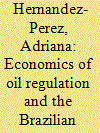

|
|
|
|
|
| Publication |
2011.
|
| Summary/Abstract |
This paper reviews the economic fundamentals for regulation in the oil industry, with a focus on the current regulatory proposal for the Brazilian oil industry. The observed exploration and production (E&P) contracts foresee much of the characteristics of the optimal contract, with a remuneration structure that combines upfront with future payments to mitigate uncertainty and incentivize exploratory efforts. In Brazil, despite slow market deconcentration since 1997's liberalization, the current oil regulation is in general consistent with an optimal regulatory response. From an economic standpoint, the 2009's new regulatory proposal prompted by the major oil discoveries offshore in Brazil reduces the power of incentive schemes with respect to exploratory and cost-reducing efforts while the changes in the net risk of the E&P offshore activities are not so clear.
|
|
|
|
|
|
|
|
|
|
|
|
|
|
|
|
| 7 |
ID:
096902
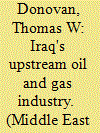

|
|
|
| 8 |
ID:
103451
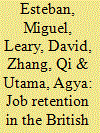

|
|
|
|
|
| Publication |
2011.
|
| Summary/Abstract |
For the case of the UK there are currently three ways of obtaining energy from sea areas, namely from wind, tides and waves. A methodology was developed to determine the future size of the offshore renewable industry based on the concept of employment factor, or the number of people required to maintain each unit of electricity production. An assessment was made of the decline in the number of people employed in oil related jobs in the North Sea and the gap that this could create in the UK's economy unless this pool of offshore expertise could find an alternative employment in the renewable sector. The paper will also investigate the effect of gradually transforming the UK's oil and gas sector into offshore renewables. If this was to happen by 2050 the UK offshore renewable industry could produce between 127 and 146 TWh of electricity, equivalent to around 57-66% of the current energy consumption in the country.
|
|
|
|
|
|
|
|
|
|
|
|
|
|
|
|
| 9 |
ID:
087360
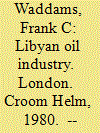

|
|
|
|
|
| Publication |
London, Croom Helm, 1980.
|
| Description |
338p.
|
|
|
|
|
|
|
|
|
|
|
|
Copies: C:1/I:0,R:0,Q:0
Circulation
| Accession# | Call# | Current Location | Status | Policy | Location |
| 019268 | 338.2728209612/WAD 019268 | Main | On Shelf | General | |
|
|
|
|
| 10 |
ID:
114832
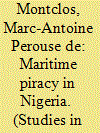

|
|
|
|
|
| Publication |
2012.
|
| Summary/Abstract |
Focused on maritime piracy in the oil-producing Niger Delta (Nigeria), this article addresses three main questions. First, how can we measure the escalation or decrease of criminal violence at sea? Secondly, what is the relationship between piracy and the (permanent) crisis of the state in Africa? Finally, what is the relationship between violence at sea and conflicts onshore? Actually, there are not enough data to monitor the real trend of maritime piracy in Nigeria. Another difficulty is that statistics and the international community focus on attacks against "big" commercial boats and the oil industry. As a result, they ignore "small" trawlers and fishermen who are the first victims of pirates in terms of homicides. Moreover, quantitative monitoring does not give details on the political economy of piracy. Too often, security analysts provide simplistic explanations that point to usual stereotypes on Africa: poverty, the failure of the state, etc. But the problem is more complex. The modernization of maritime piracy is different from a quantitative growth and has a lot to do with the local dynamics of political conflicts and crime in the oil-producing coastal states of Nigeria.
|
|
|
|
|
|
|
|
|
|
|
|
|
|
|
|
| 11 |
ID:
109447


|
|
|
|
|
| Publication |
2011.
|
| Summary/Abstract |
This paper deals with the current change of the institutional and organizational framework of the Russian oil industry. Regarding this evolution, the main characteristic is the increasing involvement of national oil companies in the upstream activities. The point is to explain this reorganization by relying on the New Institutional Economics framework. These theoretical works highlight that institutional environment and governance structures complement each other. We argue that the current reorganization in an attempt to increase the coherence of the institutional arrangement governing the transaction between the Russian state and the private oil companies.
|
|
|
|
|
|
|
|
|
|
|
|
|
|
|
|
| 12 |
ID:
175018
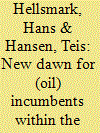

|
|
|
|
|
| Summary/Abstract |
This paper develops a more detailed understanding of when incumbent actors may become the main locomotive driving energy transitions. It also illustrates the trade-offs between policy approaches that actively seek to involve the incumbents in transitions, and policy approaches that pursue transitions without their active involvement. The paper examines state support for the bioeconomy in Sweden and concludes that public investments have been geared towards large-scale, complex and integrated biorefineries that are dependent on the active participation of the forest industry. Incumbents in the forest industry have, however, both lacked motivation and the abilities required to take the necessary steps for commercialisation of the demonstrated concepts. Instead, a rather small investment in a joint venture between actors from the forestry and oil refinery industry in Sweden has spurred learning and revenues; and it has placed an oil refinery at the centre of the future development of what we here term distributed biorefining. The main trade-off is that while this shift has opened up for cross-industrial collaborations and the production of advanced biofuels and materials, it has also paved the way for further investments in existing fossil-fuel infrastructure.
|
|
|
|
|
|
|
|
|
|
|
|
|
|
|
|
| 13 |
ID:
097005
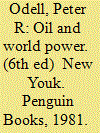

|
|
|
|
|
| Edition |
6th ed
|
| Publication |
New Youk, Penguin Books, 1981.
|
| Description |
294p.
|
|
|
|
|
|
|
|
|
|
|
|
Copies: C:1/I:0,R:0,Q:0
Circulation
| Accession# | Call# | Current Location | Status | Policy | Location |
| 054823 | 338.27282/ODE 054823 | Main | On Shelf | General | |
|
|
|
|
| 14 |
ID:
045295
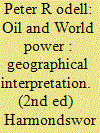

|
|
|
|
|
| Edition |
2nd ed
|
| Publication |
Harmondsworth, Penguin Books, 1970.
|
| Description |
ix, 177p
|
|
|
|
|
|
|
|
|
|
|
|
Copies: C:1/I:0,R:0,Q:0
Circulation
| Accession# | Call# | Current Location | Status | Policy | Location |
| 011066 | 333.8232/ODE 011066 | Main | Withdrawn | General | |
|
|
|
|
| 15 |
ID:
085377
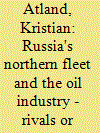

|
|
|
|
|
| Publication |
2009.
|
| Summary/Abstract |
Described as one of the world's most promising new energy provinces, the European Arctic is no longer primarily seen as a military playground. Russia's approach to the region is increasingly governed by national economic interests rather than by national security interests. The development of offshore oil and gas fields, the construction of new pipelines and terminals, the increasing traffic of oil tankers to Western Europe and the United States, and the conversion of naval yards to civilian production represent both new challenges and new opportunities for the Russian Navy. Issues that were previously considered crucial to the country's national security have slowly but steadily been "desecuritized," and new patterns of civil-military relations have emerged. This article discusses the relationship between the Russian petroleum industry and the Northern Fleet and the interplay between Russian commercial and military interests in the post-cold war European Arctic.
|
|
|
|
|
|
|
|
|
|
|
|
|
|
|
|
| 16 |
ID:
163262
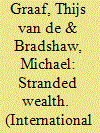

|
|
|
|
|
| Summary/Abstract |
This article argues that the oil industry is unlikely to return to the pre-2014 status quo as two profound shifts in technology and markets are dramatically changing the longer-term outlook for the oil industry. In the short term, traditional producers will feel persistent pressure from the shale revolution, a disruptive technology that has altered the cost curve and elasticity of oil supply. In the medium term, the industry must confront a structural slowdown and eventual peak in demand owing to innovation and evolving consumer preferences, related in part to concerns over climate change. Together, these shifts reflect a new energy order in which oil is no longer an exhaustible resource, new trading patterns emerge and oil prices exhibit greater short-term volatility amid a long-term declining trend. These new rules of the game force us to reconsider some of the theories and concepts of the international political economy of oil. We flag three key political effects from these market shifts: first, key oil-producing states face economic and political turmoil; second, OPEC cannot influence the price of oil in the long term by cutting output; and third, power is redistributed in the international system.
|
|
|
|
|
|
|
|
|
|
|
|
|
|
|
|
| 17 |
ID:
131896
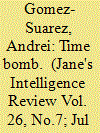

|
|
|
| 18 |
ID:
153999
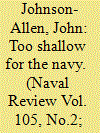

|
|
|
| 19 |
ID:
068243
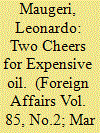

|
|
|
| 20 |
ID:
045236
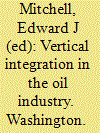

|
|
|
|
|
| Publication |
Washington, American Enterprise Institute for Public Policy Research, 1976.
|
| Description |
214p
|
| Standard Number |
084473215X
|
|
|
|
|
|
|
|
|
|
|
|
Copies: C:1/I:0,R:0,Q:0
Circulation
| Accession# | Call# | Current Location | Status | Policy | Location |
| 017059 | 338.27282/VER 017059 | Main | On Shelf | General | |
|
|
|
|
|
|
|
|
|